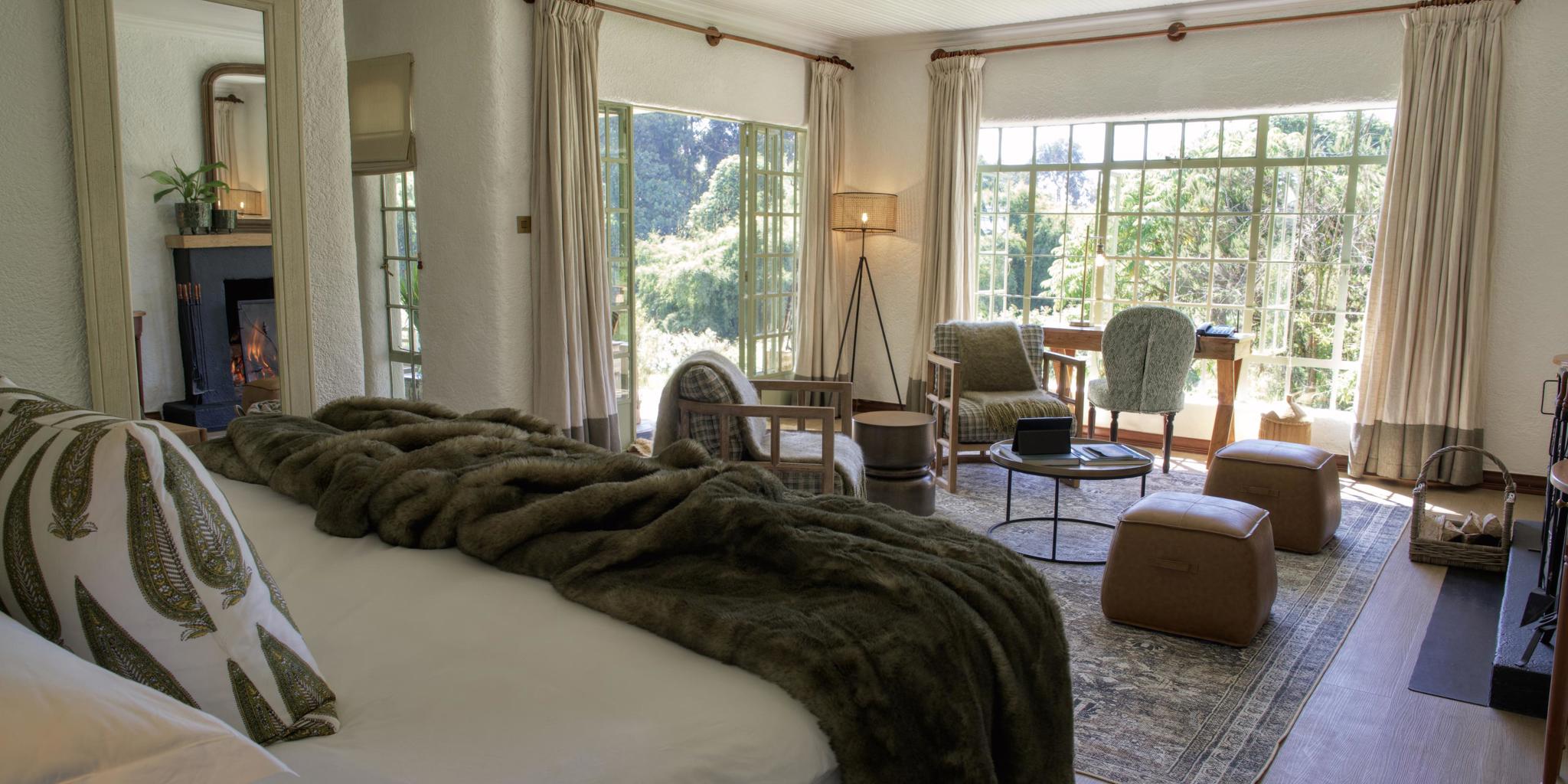While on your gorilla safari in Volcanoes National Park you can have a sustainable stay at Wilderness Sabyinyo Lodge with six cottages involving two suites and one family cottage vastly comfortable and very Rwandan stone buildings with Rwandan terracotta tile roofs, locally flavoured décor and chic Venetian plaster bathrooms.

While here, meals are hearty and diverse: delectable cauliflower and spinach soups, cheese soufflé, pork loin, aubergine with yogurt and dill and, for breakfast, farm-fresh cheese and eggs accompanied by divine Rwandan coffee. South African wine options are plentiful and a perfect pairing for that fireplace.
The main lodge building has one of the coziest sitting rooms and is home to more lovely fireplaces. Outside is sheer serenity, gorgeously green grounds beckoning with all manner of activities: escorted bird watching walks, mountain bike excursions, Gorilla trekking, hikes to the Golden Monkeys, a trek up Mt. Bisoke to see its deep crater lake.
Sabyinyo is Rwanda’s first community-owned lodge, owned by SACOLA, a community trust that uses rentals and fees to drive socio-economic and conservation initiatives in the communities adjacent to the national park.
The Sabyinyo Community Livelihood Association (SACOLA) was simultaneously set up to manage the revenues created by the lodge and to help identify areas or issues that could be improved by using the funds. Each visitor to the lodge contributes a nightly community fee and the lodge itself pays monthly rental fees, which drive socio-economic and local conservation initiatives in the neighborhood adjacent to the park.
The improved the lives and well being of those living on the periphery of the mountain gorilla’s habitat. After the Rwandan genocide against the Tutsi in 1994, many women were left widowed and had been ostracized from their communities – they were literally living in isolation and surviving in the forests. SACOLA built houses for genocide survivors and having a home provided them with a sense of ownership, security and stability.
Many were also given a project such as livestock or poultry, to assist in developing a livelihood and independence. SACOLA bought them the chickens and chicken coops, and many of these previously ‘forgotten’ women joined forces and friendships, so that they could support and socialize together – and ultimately overcome their past.
One of the core values is the education and investment into the next generation of caretakers of these amazing and prolific wildlife areas. School children hold the future protection and survival of the planet in their hands; it’s critically important to nurture and encourage their love of conservation while they are still young.
The list of projects created and the number of people and families that have been positively impacted by the lodge and the SACOLA Trust, after many years of successful operation, are now too extensive to list individually – which is a good thing of course. Electricity supply, schools, computer labs, the construction of roads, bridges, drainage systems, water points and the distribution of water tanks – so that people can collect the rainwater from their roofs – are just some of the many areas developed and improved in the villages.
Many agricultural projects have been established including pig and sheep farming. There is huge support for Rwanda’s ‘one cow per one poor family’ program through the donation of hundreds of cows, which is aimed at cutting poverty in rural areas. A number of guests at the lodge have been kind enough to donate towards this initiative, completely transforming the lives of vulnerable families by alleviating food insecurity and also reducing ‘hoof-prints’ greenhouse gas emissions.
Health centres have been built and health insurance secured for especially poor members of the community, along with payment of school fees for children whose parents are mostly concerned about where tomorrow’s meal will come from.
In consideration to conservation, anti-erosion bamboo has been planted along natural waterways and the constant maintenance of the park boundary’s stone wall is a full-time job for many.
The Lodge is currently very focused on supporting the unmarried mothers of the Turenguzebima Sewing Project in the town centre. Most of these women have been scorned from society due to their children born out of wedlock and have been rejected from their family home, leading to extreme hardship and poverty.
The main goal in this has been to reduce the reliance and burden of communities on the natural resources of Volcanoes National Park, so that Rwanda’s mountain gorillas have the best chance of survival and providing added community benefits at the Volcanoes National Park.